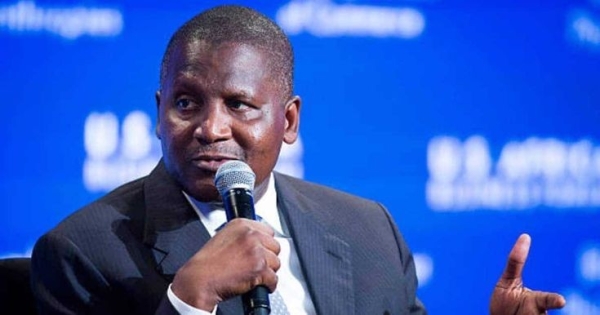Select a category
Advertisement
profile/4923images28.jpeg
Bikpadan111

Effecting A Change In Nigeria: A Call To Action For Politicians
~2.2 mins read
_Effecting Change in Nigeria: A Call to Action for Politicians_
Nigeria, a country with immense potential, has been hindered by corruption, inefficiency, and poor leadership. To effect change, Nigerian politicians must prioritize the needs of the people, foster a culture of accountability, and implement policies that promote sustainable development.
*1. Lead by Example*
Politicians must demonstrate integrity, transparency, and accountability in their personal and public lives. By doing so, they will set a positive tone for the rest of the country.
*2. Engage in Meaningful Dialogue*
Politicians must listen to the concerns of citizens, engage in constructive debates, and seek input from experts to inform policy decisions.
*3. Prioritize Infrastructure Development*
Investing in infrastructure, such as roads, electricity, and healthcare, will create jobs, stimulate economic growth, and improve the quality of life for Nigerians.
*4. Foster a Culture of Accountability*
Politicians must ensure that public funds are transparently managed, and that those who misappropriate funds are held accountable.
*5. Promote Education and Skills Development*
Investing in education and skills development will equip Nigerians with the skills needed to compete in the global economy.
*6. Encourage Entrepreneurship and Innovation*
Politicians must create an environment that fosters entrepreneurship, innovation, and private sector growth, which will drive economic development and job creation.
*7. Address Corruption*
Politicians must tackle corruption head-on, by strengthening anti-corruption institutions, and ensuring that those who engage in corrupt practices are held accountable.
*8. Ensure Security and Justice*
Politicians must prioritize the security and well-being of citizens, by investing in the military, police, and judiciary, and ensuring that the rule of law is upheld.
*9. Foster National Unity*
Politicians must promote national unity, by encouraging inclusivity, and addressing the concerns of all regions and ethnic groups.
*10. Put the People First*
Politicians must prioritize the needs of the people, by listening to their concerns, and implementing policies that benefit the masses, not just a privileged few.
In conclusion, effecting change in Nigeria requires a commitment to accountability, transparency, and the well-being of citizens. By following these steps, Nigerian politicians can create a brighter future for the nation.
*Recommendations*
1. *Establish a Transparent Budgeting System*: Ensure that public funds are transparently managed, and that budgeting decisions are made in consultation with citizens.
2. *Create an Independent Anti-Corruption Agency*: Strengthen anti-corruption institutions, and ensure that they are independent and effective.
3. *Invest in Education and Skills Development*: Prioritize education and skills development, to equip Nigerians with the skills needed to compete in the global economy.
4. *Foster a Culture of Entrepreneurship*: Create an environment that fosters entrepreneurship, innovation, and private sector growth.
5. *Ensure Security and Justice*: Prioritize the security and well-being of citizens, by investing in the military, police, and judiciary.
By implementing these recommendations, Nigerian politicians can create a brighter future for the nation, and ensure that the needs of citizens are prioritized.
profile/4923images28.jpeg
Bikpadan111

Facts About Aliko Dangote: Wealthy Business Magnate
~1.9 mins read

_Aliko Dangote: The Wealthy Business Magnate_
Aliko Dangote is a Nigerian business magnate and entrepreneur who has built a business empire that spans across various industries, including cement, sugar, and petrochemicals. With a net worth of over $20 billion, Dangote is one of the richest men in Africa and the world. Here are two facts that contribute to his wealth:
*Fact 1: Diversified Business Portfolio*
Dangote's wealth can be attributed to his diversified business portfolio, which includes:
- _Dangote Cement_: The largest cement producer in Africa, with operations in 10 countries.
- _Dangote Sugar_: A leading sugar producer in Nigeria, with a production capacity of 2.5 million tons per year.
- _Dangote Petrochemicals_: A petrochemicals plant that produces fertilizers, plastics, and other chemicals.
- _Dangote Refinery_: A $15 billion oil refinery that will produce petroleum products, including gasoline, diesel, and jet fuel.
Dangote's diversified business portfolio has allowed him to minimize risks and maximize profits, contributing significantly to his wealth.
*Fact 2: Strategic Investments and Partnerships*
Dangote's wealth can also be attributed to his strategic investments and partnerships, including:
- _Partnership with Holcim_: Dangote partnered with Holcim, a Swiss-based cement producer, to expand his cement business in Africa.
- _Investment in Dangote Refinery_: Dangote invested $15 billion in the Dangote Refinery, which will produce petroleum products and reduce Nigeria's reliance on imported fuels.
- _Investment in Dangote Liquefied Natural Gas (LNG) Project_: Dangote invested $5.3 billion in the Dangote LNG project, which will produce liquefied natural gas for domestic and international markets.
- _Partnership with Bill Gates Foundation_: Dangote partnered with the Bill Gates Foundation to improve healthcare and education in Nigeria.
Dangote's strategic investments and partnerships have allowed him to expand his business empire, increase his profits, and contribute to the economic development of Nigeria and Africa.
*Conclusion*
Aliko Dangote's wealth can be attributed to his diversified business portfolio and strategic investments and partnerships. His business empire, which spans across various industries, has made him one of the richest men in Africa and the world. Dangote's success is a testament to his entrepreneurial spirit, business acumen, and commitment to contributing to the economic development of Nigeria and Africa.
*Recommendations*
1. _Diversify Your Business Portfolio_: Consider diversifying your business portfolio to minimize risks and maximize profits.
2. _Invest in Strategic Partnerships_: Invest in strategic partnerships that can help you expand your business and increase your profits.
3. _Invest in Emerging Markets_: Consider investing in emerging markets, such as Africa, where there are significant opportunities for growth and development.
4. _Support Economic Development_: Consider supporting economic development in your community or country by investing in infrastructure, education, and healthcare.
Advertisement
profile/4923images28.jpeg
Bikpadan111

Participation In Different Careers
~1.8 mins read
_Participation in Different Occupations: A Catalyst for Personal and Economic Growth_
Participating in different occupations can be a valuable experience for individuals, fostering personal and economic growth. By engaging in various professions, individuals can develop diverse skills, gain new perspectives, and enhance their adaptability.
*Personal Growth*
1. *Skill Development*: Participating in different occupations exposes individuals to various skills, such as communication, problem-solving, and leadership.
2. *Self-Discovery*: Trying new professions helps individuals identify their strengths, weaknesses, and passions, leading to a deeper understanding of themselves.
3. *Resilience and Adaptability*: Juggling multiple occupations builds resilience and adaptability, essential for navigating life's challenges.
4. *Networking Opportunities*: Engaging in different occupations expands professional networks, potentially leading to new opportunities and collaborations.
*Economic Growth*
1. *Diversified Income Streams*: Participating in multiple occupations can create diverse income streams, reducing financial dependence on a single source.
2. *Entrepreneurial Spirit*: Trying new professions can spark entrepreneurial ideas, leading to the creation of new businesses and job opportunities.
3. *Economic Stability*: A diverse range of occupations can contribute to economic stability, as individuals are less vulnerable to industry-specific downturns.
4. *Innovation and Creativity*: Exposure to various professions can inspire innovative solutions and creative thinking, driving economic growth.
*Challenges and Limitations*
1. *Time Management*: Balancing multiple occupations requires effective time management, which can be challenging.
2. *Role Confusion*: Engaging in different professions may lead to role confusion, making it essential to maintain a clear sense of purpose and identity.
3. *Financial Constraints*: Participating in multiple occupations may require significant financial investments, which can be a barrier for some individuals.
4. *Burnout and Exhaustion*: Overcommitting to multiple occupations can lead to burnout and exhaustion, highlighting the importance of self-care and prioritization.
*Conclusion*
Participating in different occupations can be a valuable experience for personal and economic growth. While challenges and limitations exist, the benefits of skill development, self-discovery, resilience, and economic stability make it an ideal approach for those willing to take on the challenge.
*Recommendations*
1. *Explore Interests*: Identify areas of passion and interest, and explore occupations related to those fields.
2. *Set Clear Goals*: Establish clear goals and priorities for each occupation, ensuring a sense of purpose and direction.
3. *Manage Time Effectively*: Develop effective time management skills to balance multiple occupations.
4. *Prioritize Self-Care*: Maintain a healthy work-life balance, prioritizing self-care and well-being.
5. *Seek Support*: Surround yourself with a supportive network, including mentors, peers, and professionals in your desired fields.
profile/4923images28.jpeg
Bikpadan111

United State Of America Goals By 2030
~1.3 mins read
The United States has been actively involved in the development and implementation of the 2030 Agenda for Sustainable Development ¹. The 2030 Agenda is a plan of action for people, planet, and prosperity, which seeks to strengthen universal peace in larger freedom.
*Key aspects of the 2030 Agenda include:*
- Eradicating poverty in all its forms and dimensions, including extreme poverty
- Ensuring sustainable development in its three dimensions – economic, social, and environmental – in a balanced and integrated manner
- Building upon the achievements of the Millennium Development Goals and seeking to address their unfinished business
- Ending hunger and achieving food security
- Providing inclusive and equitable quality education at all levels
- Promoting physical and mental health and well-being, and extending life expectancy for all
*The United States' role in the 2030 Agenda:*
The United States has played a significant role in shaping the 2030 Agenda and has committed to implementing its goals and targets. The U.S. has emphasized the importance of private sector engagement, innovation, and technology in achieving the Sustainable Development Goals.
*U.S. initiatives and programs:*
The United States has launched several initiatives and programs to support the implementation of the 2030 Agenda, including:
- The U.S. Global Development Strategic Plan, which outlines the U.S. approach to global development and its contribution to the 2030 Agenda
- The U.S. Climate Change Action Plan, which aims to reduce greenhouse gas emissions and address the impacts of climate change
- The U.S. Global Health Strategy, which seeks to improve global health outcomes and reduce health disparities
These initiatives demonstrate the United States' commitment to the 2030 Agenda and its role as a global leader in promoting sustainable development ¹.
profile/4923images28.jpeg
Bikpadan111

Nigeria's Potential Achievement By 2030
~2.4 mins read
_Nigeria's Potential Achievements by 2030_
As Nigeria continues to strive towards achieving the Sustainable Development Goals (SDGs), the country is poised to make significant progress in various sectors. By 2030, Nigeria is expected to achieve the following:
_Economic Growth_
- Nigeria is projected to become one of the world's 20 largest economies, with a GDP of over $1 trillion.
- The country is expected to diversify its economy, reducing its dependence on oil exports and increasing its non-oil exports.
_Infrastructure Development_
- Nigeria is expected to complete several major infrastructure projects, including the Lagos-Ibadan Expressway, the Abuja-Kaduna-Chikun Railway, and the Second Niger Bridge.
- The country is also expected to improve its energy sector, increasing access to electricity and reducing power outages.
_Education_
- Nigeria is expected to achieve universal primary education, with all children having access to quality education.
- The country is also expected to increase its secondary education enrollment rate, with a focus on STEM education.
_Healthcare_
- Nigeria is expected to improve its healthcare system, increasing access to quality healthcare services and reducing mortality rates.
- The country is also expected to eradicate diseases such as polio, malaria, and HIV/AIDS.
_Poverty Reduction_
- Nigeria is expected to reduce its poverty rate, with a focus on rural development and social protection programs.
- The country is also expected to increase its social safety net programs, providing support to vulnerable populations.
_Environmental Sustainability_
- Nigeria is expected to improve its environmental sustainability, increasing its renewable energy sources and reducing its carbon emissions.
- The country is also expected to protect its natural resources, including its forests, wetlands, and wildlife.
_Key initiatives driving progress:_
1. _Nigeria's National Development Plan (2021-2030)_: A comprehensive plan that outlines the country's development priorities and strategies.
2. _The Economic Recovery and Growth Plan (2017-2020)_: A plan that aims to restore Nigeria's economy and promote sustainable growth.
3. _The Nigerian Industrial Revolution Plan (2013-2020)_: A plan that aims to promote industrial development and diversify the country's economy.
4. _The National Health Insurance Scheme (NHIS)_: A scheme that aims to provide universal health coverage to all Nigerians.
_Challenges and opportunities:_
While Nigeria has made significant progress in various sectors, the country still faces several challenges, including:
1. _Security concerns_: The country continues to face security challenges, including Boko Haram insurgency and banditry.
2. _Corruption_: Corruption remains a significant challenge in Nigeria, affecting various sectors of the economy.
3. _Infrastructure deficits_: The country's infrastructure deficits, including roads, electricity, and water, remain a significant challenge.
Despite these challenges, Nigeria has several opportunities for growth and development, including:
1. _Demographic dividend_: Nigeria's large and young population presents a significant opportunity for economic growth and development.
2. _Natural resources_: The country's natural resources, including oil, gas, and minerals, present a significant opportunity for economic growth.
3. _Private sector engagement_: The country's private sector has the potential to drive economic growth and development, particularly in the areas of agriculture, manufacturing, and services.
In conclusion, Nigeria is poised to make significant progress in various sectors by 2030. However, the country must address its challenges and leverage its opportunities to achieve sustainable development.
Advertisement
profile/4923images28.jpeg
Bikpadan111

3 Facts To Know About Real Friends
~1.7 mins read
_3 Facts to Know About Real Friends_
Real friends are a treasure trove of love, support, and companionship. They are the ones who stand by your side through thick and thin, offering a listening ear and a helping hand whenever needed. Here are three facts to know about real friends:
_Fact 1: Real Friends Accept You for Who You Are_
Real friends accept you for who you are, without judgment or condition. They don't try to change you or mold you into someone you're not. Instead, they love and appreciate you for your unique qualities, strengths, and weaknesses. They understand that everyone has flaws and imperfections, and they're willing to work through challenges together.
_Fact 2: Real Friends Are Supportive and Encouraging_
Real friends are supportive and encouraging, always pushing you to be your best self. They believe in your abilities and potential, even when you don't believe in yourself. They offer words of encouragement, provide constructive feedback, and celebrate your successes. They're also there to offer a shoulder to cry on when you're going through tough times.
_Fact 3: Real Friends Communicate Openly and Honestly_
Real friends communicate openly and honestly with each other, sharing their thoughts, feelings, and desires in a respectful and empathetic manner. They don't hide behind masks or pretend to be someone they're not. Instead, they're authentic and transparent, always striving to understand each other's perspectives and needs.
In conclusion, real friends are a precious gift that can bring joy, comfort, and meaning to our lives. By accepting us for who we are, being supportive and encouraging, and communicating openly and honestly, real friends help us grow and thrive as individuals.
_Recommendations_
1. _Nurture Your Relationships_: Invest time and effort in nurturing your friendships, just as you would any other relationship.
2. _Be a Good Friend_: Be the kind of friend you want to have - supportive, encouraging, and honest.
3. _Appreciate Your Friends_: Show your friends that you appreciate and value them, through small gestures and kind words.
4. _Communicate Openly_: Communicate openly and honestly with your friends, sharing your thoughts, feelings, and desires.
5. _Forgive and Forget_: Forgive your friends for their mistakes and forget past conflicts, just as you would want them to do for you.
By following these recommendations, you can build strong, lasting friendships that bring joy and fulfillment to your life.

 Bikpadan111
Bikpadan111